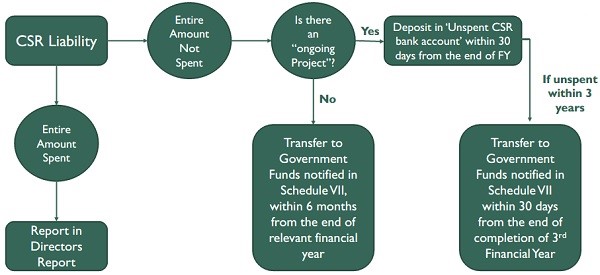

On April 1, 2014, India became the first country to make it mandatory for certain companies to undertake philanthropic efforts toward social, environmental and human development concerns. The resultant Section 135 of the Companies Act 2013 stated that every company with a net worth of over ₹500 Crores, or a net profit of over ₹5 Crores in the previous financial year, or a turnover of over ₹1,000 Crores, will have to spend 2 per cent of their average net profit of the last three years on CSR activities.
Reciprocating the contribution of local communities in their success, key players in the Indian industry have been contributing to development in certain regions for a long time, often beyond the 2 per cent mandate issued by the CSR Policy. However, most companies failed to comprehend CSR and take responsibility for their neighbouring communities. As a result, when the CSR Policy was introduced, many organisations found the legislation too harsh and thought that it would be repealed soon after.
In the initial years of the Policy, many organisations were partially or entirely non-compliant. However, companies that complied with the Policy used their funds and innovative approaches to achieve groundbreaking developmental goals. Some CSR programmes even became model projects that were scaled further by the Government. Such programmes by compliant organisations motivated the Government to make the CSR Policy stringent to a point where companies could delay their social responsibility but never escape it.
In 2021, the Government amended the CSR Policy to prohibit companies from using unspent CSR funds for business purposes or setting off past CSR expenses against future obligations. The amendment capped administrative overheads and involvement of international organisations to ensure programmes were beneficiary-focused. It also mandated the registration of executing agencies and assessing the impact of CSR programmes.

The pandemic required the Government to collaborate with India Inc. to bring its core systems back to their original form. So, in 2021, the Government amended the CSR Policy to prohibit companies from using unspent CSR funds for business purposes or setting off past CSR expenses against future obligations. The amendment capped administrative overheads and involvement of international organisations to ensure programmes were beneficiary-focused. It also mandated the registration of executing agencies and assessing the impact of CSR programmes.
 Provisions in the 2021 amendment in the CSR Policy were more detailed and structured than the original. Besides clarifying basic concepts like the definition of CSR, CSR policy and CSR implementation, the amendment brought clarity to complex concepts in the Policy, reducing ambiguities that could be exploited by corporates, and introduced uniformity as it stated the procedures to be followed. Naturally, companies that were partially or entirely non-compliant had to comply with the CSR Policy.
Provisions in the 2021 amendment in the CSR Policy were more detailed and structured than the original. Besides clarifying basic concepts like the definition of CSR, CSR policy and CSR implementation, the amendment brought clarity to complex concepts in the Policy, reducing ambiguities that could be exploited by corporates, and introduced uniformity as it stated the procedures to be followed. Naturally, companies that were partially or entirely non-compliant had to comply with the CSR Policy.
The COVID-19 pandemic greatly impacted India Inc. during FY 2020-21. Therefore, amendments introduced in 2021 did not show an immediate effect on CSR compliance and efficiency. However, now that the Government has clogged the basic loopholes in the Policy regarding CSR compliance and efficient deployment of CSR funds, it is focusing on maximising the effectiveness of CSR programmes or impact as commonly addressed in the development sector.
 On February 11, 2022, the Ministry of Corporate Affairs issued a notification that made it compulsory for India Inc. to present a detailed report on CSR activities through an 11-page form. This process was designed to provide the Government with an idea of a company’s CSR expenditure, programme execution and impact of CSR programmes by eligible companies across India. The regulation came into immediate effect, and information related to FY 2020-21 had to be submitted by the end of March 2022 itself.
On February 11, 2022, the Ministry of Corporate Affairs issued a notification that made it compulsory for India Inc. to present a detailed report on CSR activities through an 11-page form. This process was designed to provide the Government with an idea of a company’s CSR expenditure, programme execution and impact of CSR programmes by eligible companies across India. The regulation came into immediate effect, and information related to FY 2020-21 had to be submitted by the end of March 2022 itself.
 Just like the introduction of the CSR Policy in 2014, this notification produced mixed reactions among corporates across India. Some CSR leaders found the increase in reporting an additional burden because some of the information that the Government sought was already a part of their company’s annual reports. On the other hand, some leaders feel that collecting CSR data through a uniform approach would allow the Government to analyse the information and leverage insights to enhance its developmental strategy.
Just like the introduction of the CSR Policy in 2014, this notification produced mixed reactions among corporates across India. Some CSR leaders found the increase in reporting an additional burden because some of the information that the Government sought was already a part of their company’s annual reports. On the other hand, some leaders feel that collecting CSR data through a uniform approach would allow the Government to analyse the information and leverage insights to enhance its developmental strategy.
Irrespective of these different outlooks, the fact remained that this time, the Ministry of Corporate Affairs was determined to imbibe social responsibility within corporates to an extent where evasion or delay was not an option, and the focus was on producing impact. Given that the CSR notification was issued towards the end of FY 2021-22 and came into immediate effect for FY 2020-21, partially or entirely non-compliant organisations were jolted out of their apathy and pushed straight towards compliance.
There is no denying that recent updates to the CSR Policy have increased pressure and reporting for CSR leaders. Nevertheless, if stricter rules and added regulations push compliant organisations to focus on impact, and non-compliant companies to fully take on their social responsibility, I believe it is worth it because an ecosystem like this will produce a rapid, long-lasting impact on audiences that have remained in the dark for a long time; paving way for them and future generations to contribute to India’s growth story and also benefit from it.
As the Co-founder of a leading EdTech social enterprise, ConnectEd Technologies, we have been working with some of India’s largest socially responsible corporates to make quality education accessible to government school students. Since the outset, we have come across several CSR-eligible, small and mid-sized companies who either took the CSR policy lightly or exploited the loopholes. This year, however, we have noticed a visible change in the behaviour of such organisations as they are pushed towards compliance.
 There is no denying that recent updates to the CSR Policy have increased pressure and reporting for CSR leaders. Nevertheless, if stricter rules and added regulations push compliant organisations to focus on impact, and non-compliant companies to fully take on their social responsibility, I believe it is worth it because an ecosystem like this will produce a rapid, long-lasting impact on audiences that have remained in the dark for a long time; paving way for them and future generations to contribute to India’s growth story and also benefit from it.
There is no denying that recent updates to the CSR Policy have increased pressure and reporting for CSR leaders. Nevertheless, if stricter rules and added regulations push compliant organisations to focus on impact, and non-compliant companies to fully take on their social responsibility, I believe it is worth it because an ecosystem like this will produce a rapid, long-lasting impact on audiences that have remained in the dark for a long time; paving way for them and future generations to contribute to India’s growth story and also benefit from it.

